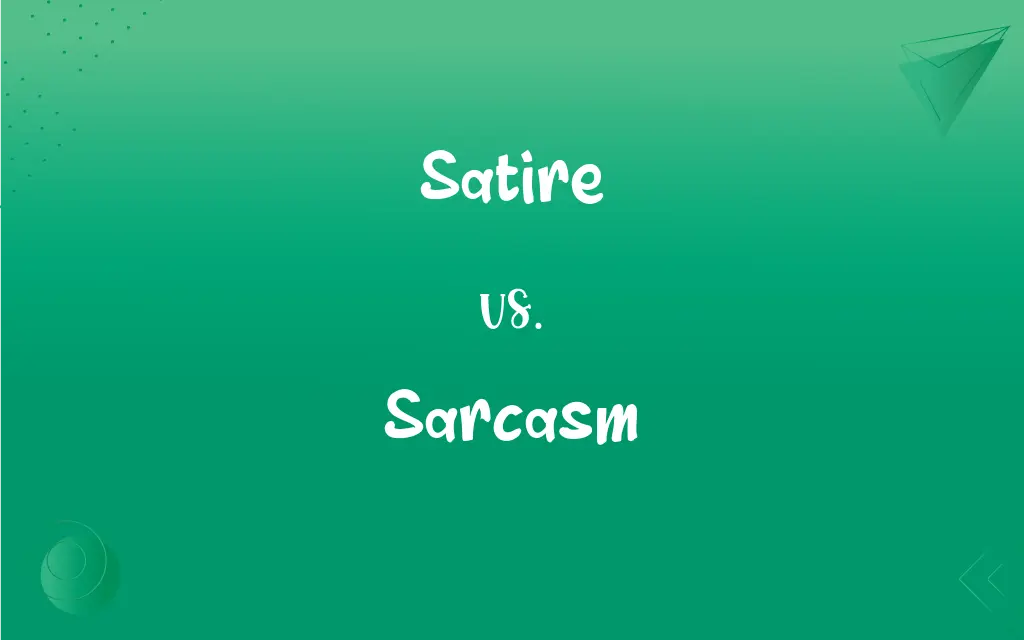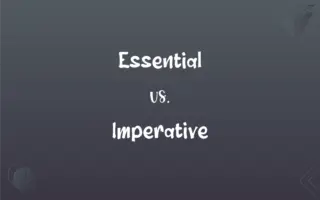Satire vs. Sarcasm: What's the Difference?
Edited by Janet White || By Harlon Moss || Published on November 18, 2023
Satire is a literary or artistic form mocking societal norms; sarcasm is a form of verbal irony intended to mock or convey contempt.

Key Differences
Satire is a technique employed by writers and artists to expose and criticize societal foolishness and corruption, often through humor, irony, and exaggeration. It aims to improve society by mocking its vices. In contrast, sarcasm is a form of speech or writing in which the literal meaning is opposite to the intended; it's a way to mock or convey contempt. The bite of sarcasm often comes from this inversion of meaning.
The primary goal of satire is not just to mock but to bring about change. Through clever use of irony and exaggeration, satirists aim to shine a light on societal issues. Sarcasm, on the other hand, might not have a grand societal goal. It’s more about the immediate sting or the ironic twist in the statement made.
Satire can be found in various forms of art: literature, plays, television shows, and more. Think of "A Modest Proposal" by Jonathan Swift or "The Colbert Report" on television. Each uses humor to critique societal norms. Sarcasm, however, is usually more direct, often used in everyday speech. It's that friend who says, "Nice job!" when you've just spilled coffee everywhere.
One crucial distinction is that satire often requires more context to understand, given that it targets broader societal issues. In contrast, sarcasm is usually understood in the immediate context of the conversation. The depth of satire can be layered, requiring keen observation to grasp fully. Sarcasm can be more straightforward, though still biting.
Comparison Chart
Nature
Literary or artistic form.
Verbal irony.
ADVERTISEMENT
Purpose
Expose and criticize societal norms.
Mock or convey contempt.
Medium
Found in literature, plays, TV shows.
Common in everyday speech.
Understanding
Often requires context for full comprehension.
Usually understood immediately.
Depth
Layered, targeting broader societal issues.
Direct, targeting immediate context.
Satire and Sarcasm Definitions
Satire
A technique to criticize society using humor and irony.
Animal Farm by George Orwell is a satire on totalitarian regimes.
ADVERTISEMENT
Sarcasm
Saying something opposite to what is meant, derisively.
No thanks, I've had enough 'help' for today, she said after he spilled water.
Satire
Using exaggeration to mock and show flaws.
Gulliver’s Travels is a satire highlighting human folly.
Sarcasm
Mocking tone belittling the subject.
What a genius move! she remarked when he locked the keys inside.
Satire
Artistic form mocking societal vices for reform.
The Daily Show employs satire to critique political events.
Sarcasm
Verbal irony mocking or showing contempt.
Oh, great! he exclaimed when his ice cream fell.
Satire
Commentary on societal issues through mockery.
South Park uses satire to comment on current events.
Sarcasm
Irony intended to mock or convey contempt.
Another stellar performance, he said after the blunder.
Satire
Literary work ridiculing societal shortcomings.
The Simpsons is a satirical portrayal of a middle-class American family.
Sarcasm
Derisive language indicating scorn or ridicule.
Because that's not dangerous at all, she commented on his juggling knives.
Satire
A literary work in which human foolishness or vice is attacked through irony, derision, or wit.
Sarcasm
A cutting, often ironic remark intended to express contempt or ridicule.
Satire
The branch of literature constituting such works.
Sarcasm
A form of wit characterized by the use of such remarks
Detected a hint of sarcasm in his voice.
FAQs
Can satire be visual?
Absolutely. Political cartoons are a classic example of visual satire.
Why do people use sarcasm?
Sarcasm can be used for humor, to mock, or to express frustration or disbelief.
Which is broader, satire or sarcasm?
Satire is broader, encompassing various mediums and techniques, while sarcasm is a specific form of verbal irony.
How is satire different from parody?
While both mock, satire targets societal flaws, while parody imitates and exaggerates a specific work.
Is satire always funny?
While satire often uses humor, its primary aim is critique, not just laughter.
Is sarcasm a form of irony?
Yes, sarcasm is a form of verbal irony where the speaker says one thing but means another.
How do you identify sarcasm?
Tone, context, and often an opposite meaning to the literal statement are clues.
Is all satire humorous?
No, some satire is more serious, using irony without humor.
Is sarcasm a sign of intelligence?
Some studies suggest understanding and using sarcasm can be indicators of cognitive skills.
Why might someone avoid sarcasm?
It can be misinterpreted, causing unintended offense or confusion.
Is sarcasm a modern construct?
No, sarcasm has ancient origins and can be found in many historical texts.
Can satire be a form of protest?
Definitely. Many use satire to protest societal issues or political decisions.
Can satire offend people?
Yes, because satire critiques, it can sometimes offend those being critiqued.
Who are famous satirists?
Jonathan Swift, George Orwell, and Mark Twain, among others.
Why is satire important?
Satire encourages societal reflection and can instigate change by spotlighting issues.
Can sarcasm be misunderstood?
Yes, without proper context or tone, sarcasm can be misinterpreted.
How can one respond to sarcasm?
Responses vary, from ignoring to retaliating with humor or clarity-seeking.
Are satirical works factual?
While based on reality, satirical works often exaggerate or fictionalize for effect.
Can sarcasm be used within satire?
Yes, sarcasm can be a tool within a satirical work to enhance its critique.
Is sarcasm always negative?
Often, but not always. Sarcasm can also be playful or light-hearted.
About Author
Written by
Harlon MossHarlon is a seasoned quality moderator and accomplished content writer for Difference Wiki. An alumnus of the prestigious University of California, he earned his degree in Computer Science. Leveraging his academic background, Harlon brings a meticulous and informed perspective to his work, ensuring content accuracy and excellence.
Edited by
Janet WhiteJanet White has been an esteemed writer and blogger for Difference Wiki. Holding a Master's degree in Science and Medical Journalism from the prestigious Boston University, she has consistently demonstrated her expertise and passion for her field. When she's not immersed in her work, Janet relishes her time exercising, delving into a good book, and cherishing moments with friends and family.






































































